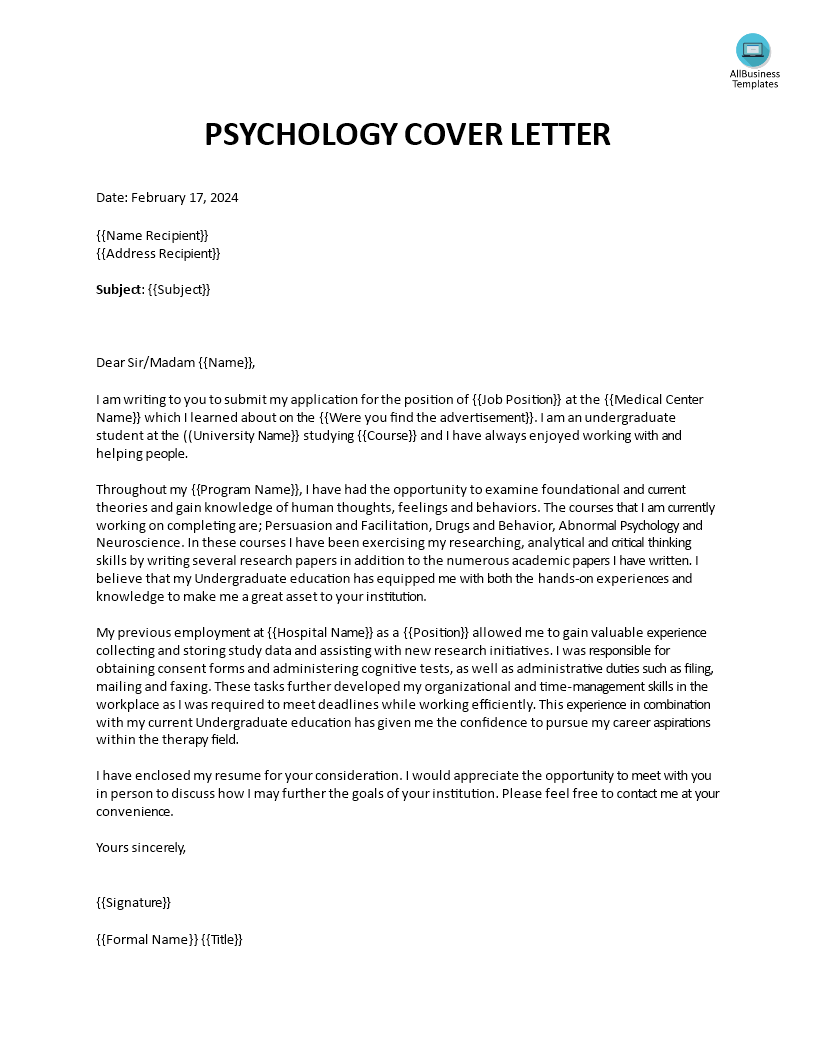Psychology Cover Letter
Save, fill-In The Blanks, Print, Done!

Download Psychology Cover Letter
Microsoft Word (.docx)Or select the format you want and we convert it for you for free:
- This Document Has Been Certified by a Professional
- 100% customizable
- This is a digital download (28.32 kB)
- Language: English
- We recommend downloading this file onto your computer.
What should I include in a cover letter for a psychologist? Are you searching for a psychology cover letter template? We have a comprehensive cover letter template that will help you craft the perfect cover letter. It includes all the necessary sections, such as the introduction, body, and conclusion.
A psychology cover letter is a document that accompanies your resume or curriculum vitae (CV) when applying for a job in the field of psychology. It is a personalized introduction to potential employers, providing them with information about your qualifications, experiences, and reasons for applying to a specific position.
What steps are needed for a psychology cover letter?
Writing an effective psychology cover letter involves several steps to ensure that you present yourself as a strong and suitable candidate for the position. Here's a step-by-step guide:
- Understand the Job Requirements:
- Carefully read the job description and requirements to understand what the employer is looking for in a candidate.
- Identify key skills, qualifications, and experiences they seek.
- Research the Organization:
- Learn about the company or organization to which you are applying. Understand its mission, values, and any recent accomplishments.
- Tailor your letter to show how your skills and interests align with the organization's goals.
- Gather Your Information:
- Collect information about your academic background, relevant coursework, internships, research projects, and any other experiences that showcase your qualifications for the position.
- Choose the Right Format:
- Use a professional format with your contact information at the top, followed by the date and the employer's information.
- Follow a standard business letter format.
- Write a Compelling Introduction:
- Start with a strong opening that mentions the specific position you are applying for and how you learned about it.
- Briefly highlight your enthusiasm and interest in the role.
- Highlight Your Qualifications:
- Use the body of the letter to emphasize your relevant skills, experiences, and achievements.
- Provide specific examples that demonstrate your capabilities and how they align with the job requirements.
- Connect with the Organization:
- Explain why you are interested in working for the particular organization. Mention specific aspects of the company's mission, values, or projects that resonate with you.
- Conclude with Enthusiasm:
- Summarize your key points in the closing paragraph.
- Express your enthusiasm for the position and your eagerness to discuss your qualifications further in an interview.
- Use Professional Language:
- Write in a professional tone, avoiding unnecessary jargon.
- Proofread for grammar and spelling errors to ensure clarity and professionalism.
- Customize for Each Application:
- Tailor your cover letter for each job application. Highlight the most relevant experiences and skills based on the specific requirements of the position.
- Close Professionally:
- End the letter with a professional closing,
Remember, a well-crafted psychology cover letter can significantly enhance your chances of getting noticed by potential employers. Personalization and attention to detail are key to making a strong impression.
Click directly on 'Open with Google Docs' or download our sample psychology cover letter template as a Word template now to enhance efficiency! Your success in delivering a well-structured and effective psychology cover letter awaits.
DISCLAIMER
Nothing on this site shall be considered legal advice and no attorney-client relationship is established.
Leave a Reply. If you have any questions or remarks, feel free to post them below.
Related templates
Latest templates
Latest topics
- Excel Templates
Where do I find templates for Excel? How do I create a template in Excel? Check these editable and printable Excel Templates and download them directly! - GDPR Compliance Templates
What do you need to become GDPR compliant? Are you looking for useful GDPR document templates to make you compliant? All these compliance documents will be available to download instantly... - Google Docs Templates
How to create documents in Google Docs? We provide Google Docs compatible template and these are the reasons why it's useful to work with Google Docs... - IT Security Standards Kit
What are IT Security Standards? Check out our collection of this newly updated IT Security Kit Standard templates, including policies, controls, processes, checklists, procedures and other documents. - Letter Format
How to format a letter? Here is a brief overview of common letter formats and templates in USA and UK and get inspirited immediately!
cheese

